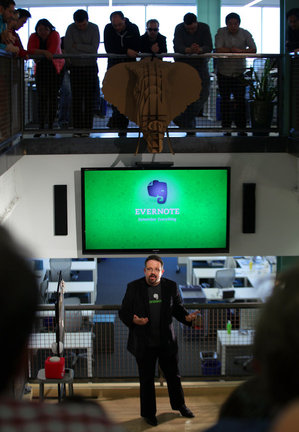“Phil Libin, chief of Evernote, at its headquarters in Redwood City, Calif.” Source of caption and photo: online version of the NYT article quoted and cited below.
(p. B1) SAN FRANCISCO — The number of privately held Silicon Valley start-ups that are worth more than $1 billion shocks even the executives running those companies.
“I thought we were special,” said Phil Libin, chief executive of Evernote, an online consumer service for storing clippings, photos and bits of information as he counted his $1 billion-plus peers.
He started Evernote in 2008 on the eve of the recession and built it methodically. “A lot of us didn’t set out to have a big valuation, we’re just trying to build something that lasts,” Mr. Libin said. “There is no safe industry anymore, even here.”
. . .
(p. B2) Silicon Valley entrepreneurs contend that the price spiral is not a sign of another tech bubble. The high prices are reasonable, they say, because innovations like smartphones and cloud computing will remake a technology industry that is already worth hundreds of billions of dollars.
. . .
The founders of the highly valued companies are old enough to remember past busts, and many shun the bubble lifestyle of fast cars and fancy parties.
Mr. Libin, who said he grew up on food stamps as the son of Russian immigrants in the Bronx, became a millionaire when he sold his first company, Engine5, to Vignette in 2000.
“The company I sold to, there were purple Lamborghinis in the garage. I got into watches,” he said. “Maybe a half-dozen, nothing over $10,000, but I needed this glass and leather watch winder.”
Evernote started as the financial crisis hit. “One night I was almost busted again,” he said, “and there was that watch winder on the shelf, mocking me.”
“Every job out there is insecure now,” he said. “People sell 10 percent of their stock, and they have an incentive to make the other 90 percent worth more. They are still working, but not worrying about what will happen to their home or their kids.”
For the full story, see:
QUENTIN HARDY. “A Billion-Dollar Club, and Not So Exclusive.” The New York Times (Weds., February 5, 2013): B1 & B2.
(Note: the online version of the story has the date February 4, 2013.)


